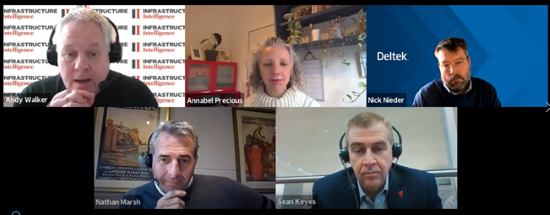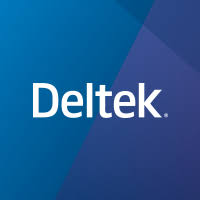Embracing disruption rather than being disrupted by it was just one of the themes to emerge at a lively Infrastructure Intelligence webinar earlier today. Rob O’Connor reports.
Embracing and investing in new technology and new ways of working, purposeful innovation, with industry collaboration and positive disruption being a key driver in continual industry improvement, all emerged as key themes during the latest Infrastructure Intelligence webinar today. (23 November 2021).
A combination of sustainability requirements, cost pressure, skills scarcity, digitalisation and a new breed of industry player, looks set to transform the construction sector – especially as new ways of working and societal changes have emerged and become the norm after the pandemic.
The webinar, organised in association with global software and solutions provider Deltek, looked at what’s going to be disrupting construction with a focus on the key changes and business developments that companies can expect to deal with – and how technology is changing the way that construction operates.
Nick Nieder, director of product management at Deltek, said: “We’ve seen some really interesting developments in working practices since the pandemic. Those clients who were digitally match-fit prior to Covid had a much less bumpy ride. Other clients are now embracing new technology and are looking beyond coping with short-term issues – they are now looking more towards both the mid and longer-term.
“One of the things we are very focussed around is purposeful innovation – looking at what a business needs and how we can support them. It’s not about being shiny for the sake of it. It’s about being simple and practical – and clients not previously match-fit that have embraced new technology are now accelerating.
“They’ve embraced new technology and made changes for the right reasons, taking on board new ways of working to improve productivity and sustainability with the best use of data. And, from a risk management perspective, if you’ve got the right information the right hands, you’ll make the right decisions.”
Sean Keyes, managing director of north-west based SME, Sutcliffe, said: “One thing we’ve done is invest in technology of the future – both on technology itself plus staff training and honing our skills. There’s no turning the clock back – digitalisation is completely here. This webinar is an example of that, with people from all over the UK in the same room.
“Productivity and sustainability is all part of digital future, and the pandemic has driven and pushed this forward. Office working has obviously changed and the switch to working remotely has on the whole been surprisingly successful. It’s vital to invest in digitalisation, to keep investing in technology and to keep improving on a continual basis. I see disruption as a continuous process to help the industry improve - but it needs to be positive disruption, not just disruption for the sake of it.
“Within that change, social value and sustainability are all important. In 100 years’ time people will look back at the industry and ask did they – hopefully not pointing the finger at any of us in this room – did they do enough for society and the environment?”

Nathan Marsh, chief digital officer at Turner & Townsend, said: “Our sector is facing a whole range of changes and we have no option but to navigate them successfully. We’re all working in a changing environment and it’s how we deal with that going forward – looking at how we work with clients, with a focus on value.
“There’s been a pretty impressive bounce back from the restrictions of the pandemic and I think we can look forward to a more systems based approach to design. The opportunity is there for the industry to operate in a more consistent way, embracing new technology and new ways of working. We mustn’t get stage fright and should work together more in collaboration as an industry. Together we have a lot to teach, but also a lot to learn.”
Looking to the future, Marsh said: “Three things need to be in place - the right mindset, a focus on skills and digital literacy and making sure the right structures with room for growth are in place. With those three things we can embrace disruption rather than be disrupted by it.”
Annabel Precious, regional director of Civic Engineers, offered an insight into how the pandemic sparked a different approach to how the industry and society works, with designing major projects to be net zero compliant being a major disrupter in itself. “The pandemic accelerated the change in the way we work – working from home, finding out what we want from life, finding a work-life balance. It helped us develop a new way of working much more flexibly,” she said.
“Societal changes saw people spend more time exploring their own local areas, which saw a new focus on the theme of 20-minute neighbourhoods,” Precious said. “Working from home also saw more focus on active travel, walking and cycling and it focussed minds on the need to transform how we design our towns and cities to help meet net zero 2050 targets.
“We’re all having our minds really focussed at the moment, particularly on the climate and the environment. We’ve gone past the time of thinking about what we need to do. We’re there already. The coming few years will be interesting to see how much new design becomes the new normal,” she said.
Infrastructure Intelligence editor Andy Walker said: “The webinar really shone a light on how the construction sector is being disrupted and how firms are adapting change. The concept of ‘purposeful disruption’, embracing positive change and making a difference to society was clear for all to see and it’s extremely encouraging to see that approach in our sector. We will be capturing these themes - and others - from the webinar in a forthcoming Disrupting Construction white paper, which is due out in the next couple of weeks.”
Click here to watch a recording of the webinar.

This special Infrastructure Intelligence webinar is organised in partnership with global software and solutions provider Deltek.

